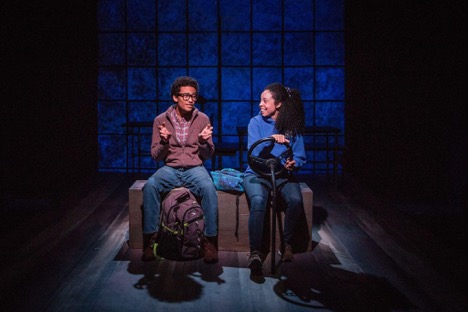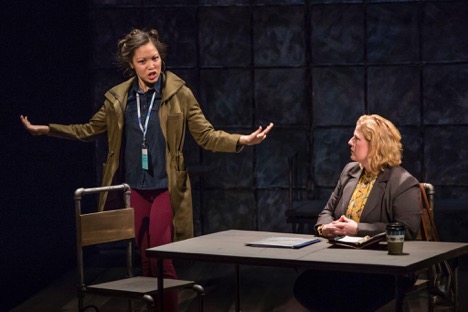Review: At “Awake,” A Carousel of American Contention

Luka Kain and Ana Roshelle Diaz in K. Lorrel Manning’s “Awake,” now open at The Barrow Group. (COURTESY OF EDWARD T. MORRIS)
January 23, 2019
What can be said for the “intimate conversation,” that tidy vignette, that threadbare ten-minute play, stripped of all frills and burdened to bear unpleasant truths, plainly? Exactly how much reverence ought we to pay intimacy, and for how much longer must it be insisted that some inoculated conversation — zoom in on two ordinary people, maybe on a park bench, and you’ll hear the sound of America — can be a convincing bellwether for the troubles dividing our nation?
Things aren’t always black and white, but I’m tired of the grey areas, too, and whatever prize they must offer playwrights who try with all their might to throw their plays into them, seeking to dramatize the political and social division in this country with some problematizing nuance.
It’s where K. Lorrel Manning has striven to set his new play “Awake,” produced at The Barrow Group and directed by Manning himself, in hopes that it might, too, reach that land of milk and honey, of political and social debate where both sides are, at least to some degree, visible.
In design, “Awake” is purposefully plain. Beauty in simplicity is the goal. First conceived at the Our Workshop East play festival, where Manning was asked to write a 10-minute play about race, “Awake” has evolved into a nine-scene collection of conversations on race, sexism, gun violence and immigration. Each disconnected from the other in story and character, the vignettes that make up “Awake” place before its audience a carousel of American contention, hoping to ordain in its meditation the thematics of division in our nation.

A hispanic mother (Nelly Savigñon) is called in to speak with her son’s teacher (Julia Ryan) about anti-semitic behavior in class. A young white woman (Anna Russell), struggling with a lagging co-worker, finds herself on a date with a racist and sexist business executive who rails against affirmative action (Garen McRoberts). Two Latinx siblings (Ana Roshelle Diaz, Luka Kain) drive to the Canadian border after their mother was deported. A young black woman (Madeleine Mfuru) hears her white boyfriend’s family using racial slurs; he (Michael Glese) defends them.
Each situation, acted by an impressive and diverse cast of 15 (among them is Manning himself), inches toward something “complex” by edging out an obvious moral victor in moments of difficult decision. Should the Hispanic mother, who’s surely intuited that her child’s disciplinary meeting is due in some part to private school parents ganging up on the only Latinx kid enrolled, take the teacher’s unclear accusations of antisemitism, disguised in a book report about Hitler, seriously (hello, Women’s March)? Should someone in an interracial relationship be forced to discipline their older, racist relatives, even if nothing will change their stubborn ways (the answer there seems obviously yes, but what do I know)? Should two children abandon their country and pass illegally into another, their uprooted future uncertain and dangerous, because its government deported their mother, herself illegally in the country?
It’s this type of moral relativism that “Awake” deals in, hoping to find in these engineered situations something worth contemplating.
Manning is an incredibly honest playwright, simple and to the point in the best of ways. His imagination in creating the vignettes that compose “Awake,” in exploring colossal issues of social justice in plain monologues and two-person scenes — the playwriting equivalent of threading a needle — is deserving of praise. And his willingness to travel to terrifying places, to venture into spaces like the minds of two school shooters (Trey Santiago-Hudson, Vinny Baierlein), eating Burger King to distract themselves while they drive to kill their peers, is refreshing — though the treatment of school gun violence in that scene is about as subtle as you’d imagine what might be achieved in the time it takes to do the dishes.
And that seems to be the problem.
If each vignette is meant to tackle some monumental piece of American sin in 10 to 15 minutes — shooting fish in a barrel — what thread might tie the play together? Moments of decision? Sure, I guess. Systemic issues of injustice? Clearly. Which ones? Racism? Sexism? Xenophobia? Gun violence? Homophobia? All of the above, and what results is a social justice potluck where neither dish, its place at the table justified, is served particularly well.









